| |
ciudad que no deja de crecer.
Therán
Quiero ir a la embajada de Turmenistán a retirar la
visa y el problema es cómo llegar a ella: lo único que sé es que está al
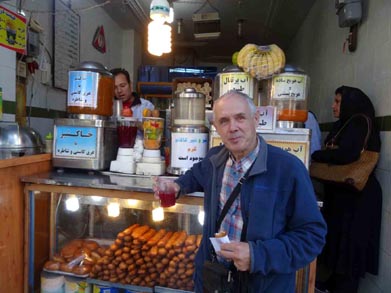
En Therán
noroeste. Paro en una plaza a preguntar, nadie conoce dónde está esa
dirección, y al final se me acercan dos policía de paisano: tampoco
saben nada pero al ver el pequeño mapa que llevo en la cámara quieren
ver todas las fotos que he sacado. En un ciber cercano me comentan que
saben dónde está ese lugar y después de una hora (hay un tráfico muy
denso) consigo llegar. Aparco cerca y mañana iré a por la visa.
Sin embargo me dicen que las visas para Turmenistán se
recogen en Meshed, cerca de dicho país. Hay un par de jóvenes iraníes |
|
también para hacer la visa, y me pongo a hablar con
ellos pues ambos saben inglés. Me acompañan a un taller pues he notado
algo raro en el embrague, después me dicen cómo conseguir una tarjeta
para el móvil, y quedamos en llamarnos en otro momento. Encontrar la
embajada de Uzbekistán es otro suplicio, pues Therán a pesar de sus
vías rápidas por el medio de la ciudad es un atasco continuo a cualquier
hora del día. Además como cada uno va a su bola sin respetar ni carriles
ni nada, esto en absoluto ayuda a dar fluidez y la policía brilla por su
ausencia. Pero es la forma que tienen de conducir y no me queda más
remedio que adaptarme: la regla principal es que el primero que hace una
maniobra tiene la preferencia, tenga o no razón.
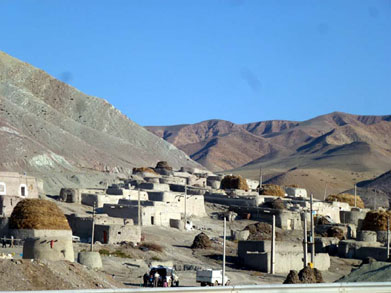
El jueves 30 al mediodía llego a la embajada de Uzbekistán pero |
|
está ya cerrada y no
abre hasta el domingo! Invito a cenar a mis nuevos amigos iraníes y me
dedico también a visitar la ciudad usando el metro. Como casualmente
está a punto de empezar la fiesta de la Ashura, conmemoración de la
muerte de Hussein,
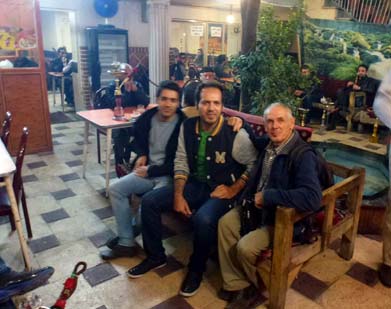
Con Saeed y su hermano en Therán
puedo ver algunas de las procesiones. Las calles de la zona donde he
aparcado están llenas de casetas que ofrecen te y pastas gratuitas tanto
a los viandantes como a los chóferes. El domingo a primera hora estoy en
la embajada de Uzbekistán y me dan la mala noticia de que la visa no ha
llegado o tal vez se ha perdido. No me apetece hacer la solicitud de una
nueva pues significaría quedarme otra semana más en Therán, así que
decido continuar viaje. Casualmente hay una chica francesa solicitando |
|
|
| |
también la visa y va por el mundo con su fagot a
cuestas y viajando también con el tema de la música.
.- Este encuentro creo que no es casual: es fruto de la magia de estos
viajes!-. le digo con cierto énfasis primero en francés, después
seguimos en inglés y acabamos hablando en castellano pues lo domina muy
bien. Son las cosas bonitas de los viajes. Me invita a cenar en la casa
del músico iraní donde vive, y en ella

hay cerveza y vino caseros (muchos iraníes lo hacen), aunque no de muy
buena calidad. Hay 3 músicos franceses más en la cena y es uno de esos
ambientes que justifican mis viajes |
|
Qom
Está a 140 km de la capital, y es una de las ciudades santas de
Irán pues en la mezquita de Jamkaran está la venerada tumba de Fatima
(siglo IX), hermana del emir Reza. La ciudad gira alrededor del
imponente complejo de dicha mezquita, y tengo la

suerte de haber llegado en el día grande de la fiesta de la Ashura. Gran
cantidad de cofradías con sus estandartes y miles de seguidores van
acercándose a la mezquita, y es estremecedor verlos dándose con el puño
golpes de pecho o con un látigo a ambos lados de la espalda siguiendo el
ritmo de los tambores. |
|
En ningún momento me ponen pegas para que grabe la especie de procesión:
más bien al contrario.
Isfahan
El 4 de noviembre llego a esta ciudad llamada “la mitad del
mundo”, y enseguida me voy a Meidan Eman (plaza real). Esta plaza es una
de las más bonitas y grandes que he visto nunca, y al fondo y a mano
derecha veo la tienda de mis amigos a los que quiero visitar de nuevo.
Entro en ella, y me recibe con la mejor de sus sonrisas: me ha
reconocido a pesar de los 11 años transcurridos. Nos damos un abrazo y
nos ponemos al día (habla muy buen inglés): su otro socio está de
vacaciones y enseguida lo llama para decirle que estoy aquí.
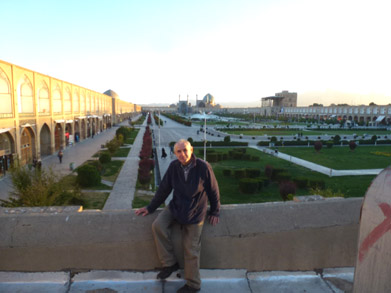
Isfahan
.- Ya no tengo la libertad que tenía entonces para irnos de |
|
|
| |
juerga-. dice y añade Saied: .-me casé y tengo dos
hermosos hijos de 6 y 4 años- mientras me enseña sus fotografías. En
aquella ocasión me llevaron a un café, trajeron con ellos el Xhantur
(especie de arpa y precursor del piano que se golpea con unas baquetas)
y el Daf (como una pandereta grande), tocaron y cantaron para mí, y al
final hasta bebimos un gin tonic
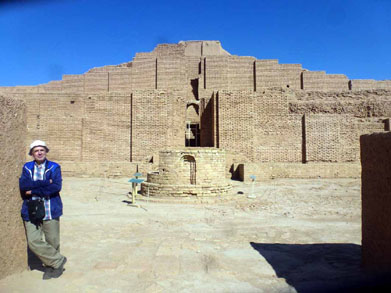
pues el dueño tenía ginebra. Subo con el a la terraza superior
(normalmente están cerradas al público) y desde allí la vista de la
plaza es espectacular.
Chogha Zanbil
Es un zigurat (centro religioso) de unos 3.300 años de |
|
antigüedad, y a pesar del tiempo transcurrido aún
conserva 3 de sus 5 pisos. Al estar en medio de la nada aún aparece más
impresionante y cuesta hacerse a la idea de que en la antigüedad hubiese
aquí toda una gran ciudad . De cualquier manera está muy bien
reconstruido, le doy un par de vueltas y pienso que ha merecido la pena
el rodeo que he tenido que dar para llegar aquí.
Ahvaz
Según voy hacia el sur el paisaje se va volviendo más
verde y el frío se hace notar más. Ya de noche y al ir a dormir alguien
pega en la puerta. Es la policía, esta ciudad está bastante cerca de
Irak, y visiblemente nerviosos me piden el pasaporte y me preguntan en
su mal inglés que hago allí. Al cabo de un rato se dan por satisfechos,
me estrechan la mano y se van. Seguramente les habrá llamado algún
vecino, y ya son muchas las veces que la policía me ha hecho la misma
pregunta. Durante el anterior viaje la policía no me molestó ni una sola
vez, y a la vista está el mosqueo generalizado que hay por bombardeos y
destrucciones indiscriminadas por parte de occidente. Irán es consciente
(todo el mundo que quiera verlo diría yo) de la implicación de occidente
en el nacimiento del llamado estado islámico y sus descerebrados como
instrumento de desestabilización de la zona, y ahora se encuentra
combatiendo contra ellos en el terreno pues lógicamente no quisiera que
lo ocurrido en Irak, Siria o Libia ocurriera en su país.
Shiraz
A 700 km está esta gran ciudad llamada la ciudad de las flores |
|
y de los poetas: de aquí eran los famosos Saadi y
Hafez. Sin embargo su casco antiguo y su mercado es muy bullicioso, como
por otra parte ocurre en todo el oriente. Vuelvo a visitar las mezquitas
de Vakil y la Jame, que significa viernes,
y cuando
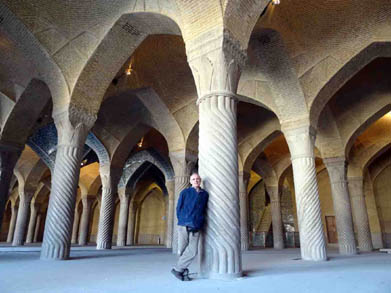
estoy sacando fotos en su gran explanada se me acerca un vigilante y me dice que no puedo sacar fotos y que le de la cámara.
Lógicamente me niego y otra persona que ve la escena le afea su conducta
y le dice que me deje en paz como así hace. Hacia las 10 de la noche
miro por las cortinillas de Ibiletxe y veo que casi todos los coches se
han ido: arranco y me voy a buscar alguna calle lateral con coches
aparcados. Ya me ha pasado |
|
|
| |
bastantes veces en Irán, y es que el aparcamiento es
muy permisivo (bueno a veces hay que pagar), incluso en las grandes
avenidas, por lo que durante el día se aparca en cualquier lugar pero a
la noche los coches desaparecen y es un misterio saber dónde los meten,
así que doy vueltas hasta encontrar alguna otra calle con coches
aparcados donde pasar la noche.
Persépolis Pasagarda Yazd
Hasta Yazd son unos 400 km y desde ya antes de Shiraz el
semidesierto ha aparecido de nuevo. Cerca de Shiraz está Persépolis que
Alejandro Magno mandó quemar en el siglo IV
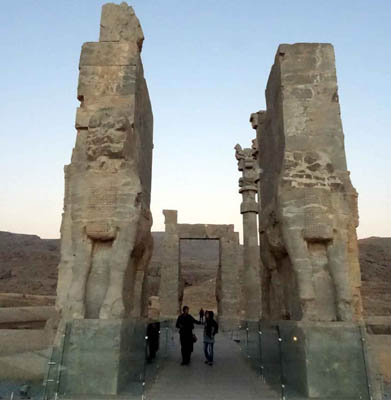 |
|
ac. Sin embargo todavía siguen impresionando las
ruinas de sus palacios y sobre todo sus preciosos bajorrelieves algunos
de los cuales se han conservado casi intactos debido a haber estado
protegidos bajo las ruinas. No lejos está Pasagarda con la gran tumba de
Ciro II, fundador del imperio Aqueménida. Los
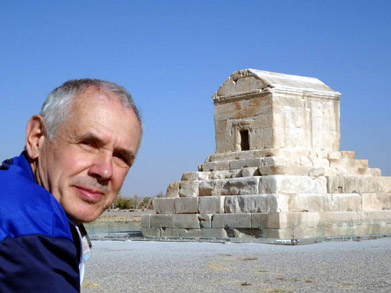
recuerdos de estos viajes son tan fuertes que cuando veo la tumba pienso
que sólo han pasado algunos meses y no años desde la última vez.
Yazd es la antesala del gran desierto
del Kavir, aunque ella también está en el desierto. En la antigüedad se
excavaron grandes canales subterráneos hasta 30 metros de profundidad
para llevar el agua a grandes distancias sin que se evaporase, y por
esta ciudad pasa el Zarch Qanat, de 90 km de largo y 2.100 pozos. Su
parte antigua es un encantador laberinto de callejuelas de adobe a veces
cubiertas para preservar de los grandes calores del verano..recuerdos de
estos viajes son tan fuertes que |
|
cuando veo la tumba pienso que sólo han pasado
algunos meses y no años desde la última vez.
Yazd es la antesala del gran desierto del Kavir,
aunque ella también está en el desierto. En la antigüedad se excavaron
grandes canales subterráneos hasta 30 metros de profundidad para llevar
el agua a grandes distancias sin que se evaporase, y por esta ciudad
pasa el Zarch Qanat, de 90 km de largo y 2.100 pozos. Su parte antigua
es un encantador laberinto de callejuelas
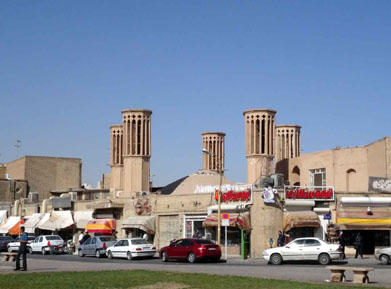
de adobe a veces cubiertas, y con sus hermosas chimeneas para aminorar
un poco los grandes calores del verano..
Chak Chak, Tabas
Según la tradición Nikbanou, segunda hija del
último rey pre-islámico Yazdegerd III, ante el miedo de ser hecha
prisionera por las tropas invasoras árabes en el año 640 dc imploró
ayuda al dios Ahura Mazda y este hizo que la montaña se abriese y la |
|
|
| |
escondiera para siempre. Este lugar es el más sagrado para el
Zoroastrismo (adoradores del fuego) y hasta aquí vienen miles de
peregrinos de toda clase de cultos y religiones, muchas veces
simplemente para pasar el día. Sigo hacia el norte dirección
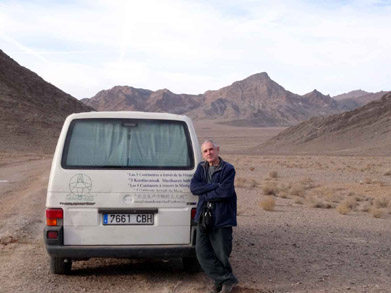
Tabas y de vez en cuando aparece alguna duna de arena en este pedregoso
desierto. Después de hacer 200 km empiezo a ver poco a poco las palmeras
que anuncian el gran oasis dentro del cual se encuentra la ciudad de
Tabas. Una vez dentro de ella resulta difícil imaginarse que estoy en
medio del desierto, pero sus pequeñas tiendas repletas de dátiles y
naranjas así lo atestiguan. El 11 de noviembre tomo dirección sureste
hacia Kerman donde volveré a unirme a la general que me llevará a la
frontera de Irán con Pakistán. Al igual que Yazd Kerman es también una
ciudad del desierto, pero la carretera y los pueblos diseminados por
ella le dan otro aspecto. |
|
Zahedan
Hasta Zahedan, última ciudad antes de la frontera hay
todavía 500 km que los hago por una buena carretera pero ya sin apenas
tráfico. Estoy entrando en una zona conflictiva como todas las situadas
cerca del atribulado Pakistán. Entro en Zahedán de noche y me quedo a
dormir cerca de una gasolinera. Pero al día siguiente no me dejan
comprar gasóleo y lo mismo me pasa en las demás. Tengo el depósito casi
vacío, así que ante la negativa decido acudir a la policía a ver si me
solucionan el problema. Al final un agente viene conmigo, nos colamos en
la gasolinera, habla con el encargado y consigo llenar el depósito,
además a precio de camionero iraní!
Problemas en la frontera
Hasta la frontera son 90 km con muchos controles
policiales. Cuando faltan 10 km me hacen parar, me dicen que es tarde
(son las 3 de la tarde) y me comentan que debo quedarme en el pueblo de
al lado a dormir, a donde voy pero escoltado por la policía. Aparco en
el parking de un hotel, la policía se va y cierran con llave la puerta
del jardín: al parecer son medidas de seguridad debido a la zona en la
que estoy. A las 8 de la mañana llega otra vez la policía, y me escoltan
hasta la frontera, donde un soldado me va acompañando a hacer todos los
trámites. Después de un buen rato me abren por fín la verja de salida y
entro en territorio Pakistaní.
.- Welcome to Pakistán-. me dice el aduanero al que extiendo mi
pasaporte. Lo ojea y me comenta.
.- Dónde está la visa de Pakistán? dice con cierto asombro..-
.-.-Me la voy a sacar aquí- le contesto
.- Pero aquí no hacemos visas- y se marcha a consultar con sus
superiores. |
|
En ese momento me doy
cuenta que he cometido un error garrafal, impropia de un viajero como
yo, por no haber comprobado si se podía sacar aquí o no. No sé si ha
sido exceso de confianza o qué (o que mi subconsciente me ha traicionado
y en realidad sólo quería llegar hasta la frontera de Pakistán), pero el
caso es que en ningún momento había puesto en tela de juicio que no
pudiese sacar la visa en la misma frontera. Para cuando llega el
funcionario soy plenamente
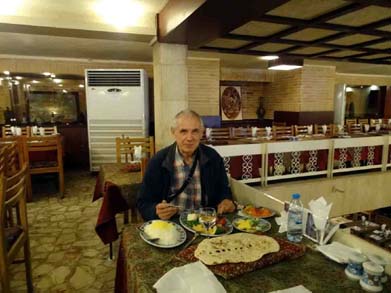
consciente de mi error y descuido.
.- Aquí solo hacemos visas para el personal diplomático pero esta claro
que Ud. no lo es. Por tanto debe volver a Zahedán (90 Km ) y hacérsela
en el consulado de Pakistán-. dice con cierta frialdad.
|
|
|
| |
No hay nada más que hablar, así que doy media
vuelta. Los funcionarios iraníes se quedan un poco perplejos pero me
dejan entrar de nuevo: qué remedio. Todavía esta allá el soldado que me
había acompañado, vuelvo con él hasta la entrada del paso fronterizo de
Irán, debo dejar Ibiletxe aparcada, monto en un jeep del ejército y
tomamos el camino de vuelta a Zahedán. Tengo el sello de salida de Irán
pero vuelvo a estar en Irán con lo que durante las horas siguientes soy
lo más parecido a una pelota de ping-pon, rebotando de un puesto militar
a otro, ahora yendo para adelante, después para atrás, según el parecer
del encargado de cada puesto. Al final le entregan mi pasaporte a un
policía, este para un coche y nos vamos hasta Zahedán. Una vez llegados
otra vez a esperar, y al cabo de un rato de nuevo escoltado me llevan a
un hotel a cuyo encargado le dan mi pasaporte. Ya en la habitación me
doy cuneta que mi situación no es nada halagüeña por mi metedura de pata
en la que prefiero no pensar demasiado para no deprimirme. Mañana iré al
consulado Pakistaní a intentar conseguir la visa.
Al día siguiente desde recepción llaman a la
escolta, que es algo aparatosa pues yo voy en un coche de la policía y
detrás vienen dos soldados en moto con su metralleta. El consulado está
muy cerca, pero hoy es sábado 22 y está cerrado: tendré que volver
mañana.
.- Aquí sólo damos visa para los iraníes de la zona, pero si consigues
la visa india te podría dar una visa de tránsito- me comenta el cónsul
pakistani al día siguiente. Y al ojear mi pasaporte me comenta que el
sello de salida del país me lo anularon con lo que aún puedo estar en
Irán 4 días más. |
|
La visa india pensaba haberla sacado en Islamabad (Pakistán), pero ante
esta nueva posibilidad me voy rápidamente al consulado indio.
.- Además de la documentación general tendrías que traernos tu
currículo, detalles del viaje y carta de la embajada española en Therán
con tus datos. – me dice el cónsul.
La carta que me piden expedida por la embajada
española no es algo común pero algunos países como Pakistán o la India
lo suelen hacer y es un mero trámite. Llamo a la embajada española en
Therán, les explico el caso y quedan en contestarme por email. Cuando lo
recibo es como un jarro de agua fría. Me dicen que como estoy en una
zona conflictiva no me van a dar ningún documento que me avale. De nada
sirve que les recalque que estoy en una situación comprometida: a lo
sumo me tramitarían llegar a la India en avión: lógicamente es una
estupidez pues voy con un vehículo. Esto es parecido a una persona que
vaya al monte, tenga un accidente, llame a los servicios de socorro y le
contesten “no haber ido al monte pues ya sabías era peligroso”. En fin
después de esto aún intento conseguir la visa para la India pero me
dicen que sin el documento de mi embajada no me la van a dar. Lo mismo
ocurre en la de Pakistán donde sin la visa de la India tampoco me van a
dar la de tránsito. Aún me quedo unos días en el hotel, pero al final
me tengo que rendir a la evidencia: la única solución que me queda es ir
a la frontera, recuperar Ibiletxe y volver a casa. Voy a la policía de
inmigración, esta vez sin escolta aunque al hotel no le gusta nada,
para pedir prolongación de la visa y después de hablar bastante con
ellos me conceden en plan favor 10 días mas que |
|
serán más que suficientes para atravesar Irán camino de Turquía (antes
en Zahedán no había problemas para conseguir extensiones de hasta un
mes.
El 27 de noviembre salgo con la correspondiente
escolta hacia la frontera. Les comento que me vuelvo a casa y que
rellenando una nueva hoja del CDP (Carnet de Passage) me podría llevar a
Ibiletxe. Después de un rato de consultar entre ellos acceden con lo que
me quito una preocupación: recuperar Ibiletxe. Sin embargo el soldado
que me acompaña sigue sin darme el pasaporte y al llegar a Zahedán se lo
entrega al recepcionista del hotel.
Vuelta a casa
Esa noche duermo de nuevo en Ibiletxe, y al día siguiente
28 de noviembre inicio el camino de vuelta. El 2 de diciembre cerca de
Elazig, Turquía, se me rompe el cardan de un palier en plena carretera y
tengo muchos problemas para conseguir una grúa que me lleve a dicha
ciudad. Dos días más tarde cerca de Kirkale, también Turquía, se me
rompe el embrague y vuelvo a tener los mismos problemas para conseguir
una grúa y el taller correspondiente.
Y por si todo esto no fuera suficiente al día
siguiente y cerca de Isambul rompo el cristal trasero mientras aparco
por la noche. Otra vez me quedo con la moral por los suelos, y ya son
demasiadas veces que me quedo al límite, pero no hay más remedio que
seguir adelante. Pongo como puedo un plástico, aparco en una gasolinera
y a dormir como pueda. El día 7 de diciembre voy a la zona de los
talleres pero es domingo y están cerrados. El lunes para las 11 de la
mañana Ibiletxe ya |
|
|
| |
tiene su nuevo cristal puesto, y reinicio el viaje a Grecia. De nuevo
ferry de Igmenitsa a Ancona, y esta vez a Francia por Genova. Prefiero
no ir a ella desde Turín-Brianson, pues es invierno y supongo habrá
nieve en los puertos. Dos días más y llego a casa. Han sido 8.000 km de
vuelta que los he hecho en dos semanas escasas y con demasiados
incidentes. Empezare a preparar el reinicio del viaje para primeros de
marzo.
Adiós Irán
La última vez que estuve aquí soñaba con que los Ayatolas
volviesen a sus palacios de invierno (las mezquitas), y que las mujeres
pudiesen elegir si querían ir con la cabeza tapada o descubierta.
Ninguno de los dos sueños se ha convertido en realidad, y tengo la
impresión de que el acoso irracional de |
|
occidente (sobre todo USA a la que siguen dócilmente
la unión europea) sobre tí está consiguiendo que una parte de la
población acepte como un mal menor al gobierno actual. La desconfianza
de la policía a los occidentales (para bien o para mal lo soy) es
entendible pues ahora mismo tienes que estar defendiéndote para que los
descerebrados del EI, en cuya formación occidente ha tenido tanto que
ver, no conviertan tu país en otra Libia o Irak o Siria. Espero que se
imponga la cordura y puedas llegar a un buen acuerdo sobre el uso
pacífico de la energía nuclear a la que tienes perfecto derecho,
desaparezcan las sanciones gratuitas que tanto daño están haciendo a tu
pueblo y puedas tener una convivencia pacífica con tus vecinos sean
chiitas o sunies (como así ha sido durante |
|
tantos siglos).
Difícil de conseguir pero si se terminan
las ingerencias ajenas en la zona, no imposible. De todas formas seguro
que necesitarás toda la suerte del mundo, pues ya los republicanos, una
de las dos ramas del partido único en USA, han dicho que si llegan
a gobernar anularán los acuerdos a los que estás intentando llegar con
los demócratas, la otra rama del partido único.
Música
Las 3 canciones están interpretadas con instrumentos
Iraníes y en la segunda suena el famoso Xhantur, precursor del piano
occidental. |
|
|
| |
|
|
English |
|
|
|
|
|
IRAN
The
night of October 27 I sleep at the border of Armenia and "nobody land".
The truth is that after the roads to and from the monastery of Tatev and
the bureaucracy in the Armenian border all that I want to do is sleep.
Until Iran's border road is flanked by high electrified fence and
although on my right I have spectacular mountain scenery I refrain from
taking pictures because I could be watched. They
stamp
the passport very
quick, hardly any people, but is not the same with the "Carnet de
Passages", the passport of Ibiletxe going from one country to another,
in the end a customs is coming with me to Ibiletxe, he takes a look,
sees the bottle of wine on a shelf and says:
.- What is that, is alcohol?
.- Yes is a bottle of wine. I know I
know I
can not
introduce
alcohol into the country but
well is for me.
.- Alcohol is banned in Iran. This is a islámic republic-.
He answers becoming
like
offended.
He adds: .- I'll have to confiscate it.-
My protests are useless, and he tells me to give him a plastic bag to
hide it. Clearly it is for him, but at least
he
is satisfied and do not look any more. From here the procedures are
fast, and immediately I find myself running through Iran. I'm skirting
the border first
Armenia and after Turkish
until Jolfa, the first city from where the road is heading to Theran. My
gasoil tank is nearly empty, so I go to a gas station and sign him to
fill it (nobody knows english).). I see
that
for taking gasoil I need a card being the price 250 rials per liter,
but as I have no card they charge me twice: 500 rials. Still I'm not
complaining because is very cheap: 15 cm of euro.
|
|
From here to the capital there are about 850 km through a
quasi-desert landscape and I am about to do it as fast as I can. The
road is
in
very good condition, wide and split, and although there is heavy traffic
of trucks I can go pretty fast. The memories that I have from when I was
here 11 years ago is that traffic was one of the scariest of the whole
trip. Traffic rules were barely respected, and I will never forget when
I saw two cars overtaking a truck at the same time one from the right
and other from the left: yet I laugh every time I remember. Anyway I
think traffic have improved and they drive quieter, but just in case I
try to go quite attentive. The problem is that I used to go taking
pictures while driving, although I know it is not advisable.
I stop to sleep at about 200 km from the capital, and 29 of October I
enter in this great city that continues to grow.
Theran
I
want to go to the embassy of Turmenistán to withdraw the visa and the
problem is how to find it: the only thing I know is that is northwest. I
stop in a place to ask, nobody knows where that direction is, and two
plainclothes police aproach me: neither knows nothing but they are
interested in watching the pictures I have in my camera.
In a nearby cyber they know where that place is and after an hour (there
is a very dense traffic) I get there. Park nearby and tomorrow I
will get the visa.
But at Turmenistán consulate they say I have to collect the visa in
Meshed, near the border. There are a couple of young Iranians also to
make the visa, and I talk to them because they both know English. |
|
They accompany me to a workshop because I've noticed something strange
in the clutch, they tell me how to get a card for mobile, and after I
will call them. To find the embassy of Uzbekistan is another ordeal, as
Theran despite its fast roads through the middle of the city is a
continuous jam at any time of day. Furthermore, as each driver goes to
his ball without respecting the driving lane or anything, this is not
helping at all the fluency of traffic. But it's the way they drive and
I have no choice but to adapt: the main rule is that, the first doing a
maneuver has the preference, (it does not matter if is right or wrong)
On
Thursday 30th
noon
I arrive to the embassy of Uzbekistan but is closed and will not open
until Sunday! I invite for dinner my new Iranian friends and I also
dedicate the evening to visit the city using the metro. As
coincidentally is about to begin the feast of Ashura, commemorating the
death of Hussein, I can see some of the processions. The streets of the
area where I parked are filled with booths offering free tea to both
pedestrians and drivers. On sunday very early I'm at the Embassy of
Uzbekistan and give me the bad news that the visa has not arrived or
maybe is missed. I do not want to apply for a new one which means to
stay another week in Theran, so I decide to continue the journey.
Incidentally there is a French girl also applying for visa and going
around the world with his bassoon and traveling as well with the theme
of music.
.- I think this meeting is not an accident: it is the result of the
magic of those trips -. I say with some emphasis, first in french,
|
|
|
| |
then in english and we finish
speaking Castilian
as
she dominates quite well. He invites me
for
dinner at the home of iranian musician where
she
lives, and for dinner we have homemade beer and wine (many Iranians do),
although is not of very good quality. At dinner there are 3 more french
musicians and those environments are the ones that justify my travels.
Qom
It
is 140 km from the capital, and is one of the holy cities of Iran as
inside the mosque of Jamkaran is the venerated tomb of Fatima (IX
century), sister of Amir Reza. The city revolves around the imposing
complex of the mosque, and I am lucky to have come at the great day of
the feast of Ashura. Lots of guilds with their banners and thousands of
fans are coming to the mosque, and it is shocking to see them pounding
chest with the fist or with a whip on both sides of their back, to the
beat of drums . At no time I have any trouble for me to record the kind
of procession: quite the contrary.
Isfahan
The
November 4th I arrive to this city called "half of the world", and then
I go straight to Meidan Eman (real space).
This square is one of the nicest and biggest I've ever seen, and at the
bottom and on the right hand I see the
shop of my friends I want to visit again.
As soon as I
enter, and I get a smile from Saied: We have recognized each other
despite the 11 years past. We give a hug and we catch (he speaks very
good english): his other partner is on vacation and call him to tell
that I'm here.
.- I have no longer the freedom I had
at that time
to go out says Saied..
.-I
married and have two beautiful children 6 and 4 years
old-. says
while teaching me the pictures of his wife and 6 and 4 years |
|
old beautiful children.
On that occasion, 11 years ago, they took me to a cafe, brought with
them Xhantur (sort of harp and piano´s precursor which is struck with a
drumstick) and the Daf (like a large tambourine), played and sang for
me. We climb to the upper terrace (they are normally closed to the
public) and from there the view of the square is spectacular.
Chogha Zanbil
It
is a ziggurat (religious center) about 3.300
years old, and despite the time elapsed still has 3 of its 5 floors.
Being in the middle of nowhere appears even more impressive and it is
hard to believe that in antiquity there was a big city here. In anyway
is fine rebuilt, I give it a couple of rounds and I think it was worth
the detour I had to take.
Ahvaz
As
I am
going south the landscape becomes more green, and
as well
litle bit colder. Nearly going to sleep someone hits the door of the
van.. It's the police, this city is quite close to Iraq, and ask me
visibly nervous my passport and in his broken English what am I doing
there. After a while they are satisfied, shake hands, tell me I can
sleep there and go.
Surely they were called by a neighbor, and there are already many times
the police have asked me the same question. During the previous trip the
police did not bother me even once, but now there is a widespread
mistrust because of the indiscriminate bombing and destruction by the
West. Iran is aware (everyone who wants to see would know) the
involvement of the West in the birth of the so-called islamic state as
an instrument of destabilization in the region, and is now fighting
against them on the ground as logically Iran does not want that what
happened in Iraq, Syria or Libya |
|
happen in his country..
Shiraz
After 500
km is this great city called the city of flowers and poets: from here
were the famous Saadi and Hafez. However its old town and its market is
very busy, as indeed occurs throughout the east. I visit mosques Vakil
and Jame,
actually Jame means Friday, and when I'm taking pictures in its vast
expanse approaches me a watcher and tells me I can not take pictures and
he wants the camera. I logically deny and another person who sees the
scene criticizes his behavior and tells him to leave me alone.
Around 10 pm I look out from the curtains of Ibiletxe and see that
almost all cars are gone, so I leave this place and go to find some side
street with parked cars. It has happened to me several times in Iran:
during the day the parking is quite permissive (well sometimes you have
to pay), even on large avenues, but at night the cars disappear and it
is a mystery to know where they put them, so I turn to find another
street with parked cars for the night.
Pasagarda Persepolis Yazd
Until
Yazd are about 400 km and
even
before the semidesert Shiraz has appeared again. Persepolis near Shiraz
the last capital of the Achaemenid empire, was put on fire by
Alexander the Great in the IV century BC,
but
still are very impressing the ruins of palaces and above all its
precious carvings some of which have been preserved almost intact due to
be protected under the ruins. No far is Pasagarda with the great tomb
of Cyrus II, founder of the Empire. The memories of those trips are so
strong that when I see the tomb think it's only been a few months and
not years since the last time I was there.. Yazd is the eve of the
|
|
|
| |
of the Great Kavir desert, but it is also in the desert. In ancient time
large underground canals dug to 30 meters deep to carry water long
distances without evaporate, and through this city passes Zarch Qanat,
90 km long with 2,100 wells. The old part is a charming maze of
alleyways adobe sometimes covered to preserve from the great heat of
summer ..
Chak Chak, Tabas
According
to tradition Nikbanou, second daughter of the last pre-Islamic king
Yazdegerd III, to fear of being taken prisoner by the Arabs invading
troops in 640 AD implored aid of the god Ahura Mazda who made the
mountain opened and hide forever. This place is the most sacred to
Zoroastrianism (fire worshipers) and here come thousands of pilgrims
from all kinds of cults and religions, often just to come for a relax
day. I head north toward the city of Tabas and occasionally some sand
dune appears in this stony desert. After making 200 km begin to appear
gradually palms announcing the great oasis within which lies the city of
Tabas. Once inside it is difficult to imagine that I'm in the desert,
but its small shops full of dates and oranges testify this. The
November 11 I head southeast towards Kerman where I will join the
general road going to Iran's border with Pakistan. As Yazd, Kerman is
also a desert town, but the road and villages scattered give it another
look.
Zahedan
Until
Zahedan, the last town before the border, there are still 500 km that I
make through a good road but without hardly any traffic. I'm entering in
a conflict zone like all located near the troubled Pakistan and
Afganistan. I enter Zahedan at night and I sleep near a gas station. But
the next day will not allow me to buy diesel and the same goes for me in
the other one. I have |
|
almost empty the tank, so I decide to go to the police to see if they
can solve the problem. Finally an agent comes with me, we slipped into
the station, talk to the manager and get refueling, in addition with
Iranian trucker price!
Problems at the border
To the Pakistan
border are 90 km with many army roadblocks. 10 km before the border they
make me to stop, tell me it's too late to cross
(it's 3 pm) so I must stay in the next village to past the night.
I'm going there escorted by police,
park in the parking lot of a hotel, the police leave and locked the
gate:
Apparently
are security measures due to the area where I am. At 8 in the morning
again the police arrive and escort me to the border, where a soldier
will accompany me to do all the paperwork. After a while they finally
allow me through the exit gate and entered Pakistani territory.
.- Welcome to Pakistan-. Customs tells me while I extend my passport. He
have a look and says:
.- Where is the visa of Pakistan?-.
.- I'm going to get here, I answer
.- But here we do not provide visas- and goes to consult his superiors.
At
that moment I realize I have made a blunder, unbecoming of a
traveler like me, not having checked if I could get here the visa or
not. I do not know if it was overconfidence or what (or my subconscious
betrayed me and really just wanted to get only to the border of
Pakistan), but the fact is that at no time I had put into question that
could not get the visa at the border. When the official arrives I am
fully aware of my mistake:
.- Here we
only provide visas for diplomatic personnel but it is clear you are not.
Therefore you must go back to Zahedan (90 |
|
Km) and get at the consulate of Pakistan.
There
is nothing more to say. I turn around, Iranian officials remain a bit
perplexed but let me in again, what can they do!. Is still there the
soldier who had accompanied me, so I return with him to the entrance of
Iran crossing border They tell me to leave Ibiletxe parked there, go
inside an army jeep and take the path back to Zahedan. I have in my
passport the Iran exit stamp so during the following hours I look like
a ping-pong ball, bouncing from one military post to another, now going
forward, then backward, asaccording the opinion of the manager of each
post. Finally they give my passport to another police, he stop a car,
and go to Zahedan. Once arrive again I have to wait, and after a while
escorted take me to a hotel to whose manager give my passport. In the
room I have time to think about my situation, and because of my
blunder is not rosy at all, but I prefer not to think too much in order
not to get depressed. Tomorrow I will go to the
pakistani
consulate to try to get the visa.
The next day from receipt call the escort, which is somewhat cumbersome:
I'm on a police car and two soldiers follow us on a motorcycle with his
machine gun. The consulate is very close, but today is Saturday 22th
and is locked: I'll have to come back tomorrow.
.- Here we only give visas for
iranians
from the area, but if you get
indian
visa I could give you transitional visa -. says Pakistani consul
next day.
When he look at my passport says: .- Iranian authorities have removed
the exit stamp from your passport so still you can stay in Iran four
days more.
My aim was to get the indian visa at Islamabad (Pakistan), but if I can
get here much better.
.- In addition to the general documents you should bring your
curriculum, travel details and letter from the Spanish embassy in |
|
|
| |
Theran with your data. - Tells me the consul.
The
letter he asks issued by the Spanish Embassy is not common but some
countries like Pakistan or India use to ask and is a mere formality. I
call the Spanish embassy in Theran, explain the case and they say will
answer by email. When I get is like a bucket of cold water: they say
they are not going to provide me with any official document because I'm
in a conflict area. They do nor bother and are nor impress at all about
my situation, and the most they will do is to help me to get a plane
ticket for going to India: it's stupid because I go with a vehicle!.All
this is like a person who goes to the mountain, have an accident, call
the emergency services and they answer "is your problem: you should not
have gone to the mountain because you knew it was dangerous." Anyway
after that I still try to get the visa for India but he says that
without the document from my embassy they are not going to give it. The
same applies in Pakistan where without the visa of India are not going
to give me the transit one. I still stay a few days at the hotel, but in
the end I have to yield to the evidence: the only solution left is to go
to the border, recover Ibiletxe and go home. I'm going to the
immigration police, this time without escort though the hotel does not
like it, ask for extension of visa and after talking a lot with them I
get 10 days more which will be more than enough to go to Turkey (before
in Zahedan there was no trouble in getting extensions up to a month).
On
November 27th I go with the corresponding escort to the
border. I comment that I going back home and after filling a new sheet
of CDP (Carnet de Passage) I would like to take Ibiletxe. After a while
consulting among them they agreed. But the soldier who accompanies me
still do not want to give me the passport . |
|
and on
reaching Zahedan gives it to the receptionist at the hotel
Coming home
That
night sleep again in Ibiletxe, and the next day November 28th
I start the way back home. On December 2th near Elazig, Tuquía, I break
a driveshaft on the highway and I have many problems getting a crane to
take me to the city. Two days later near Kirkale also Turkey, I break
the clutch and again have the same problem getting a crane and the
corresponding workshop. And if all this were not enough the next day and
near Isambul break the rear window while I park at night. Again my
morale is in tatters, after so many troubles in a few days. I am to the
limit, but there is no other choice but to move forward. I put a
plastic, park in a gas station and sleep as I can. On December 7th
I go to the workshop area but is Sunday and are closed. On Monday about
11 am Ibiletxe already have its new glass set, and resume the trip to
Greece. Again Igmenitsa, ferry to Ancona but this time to France by
Genova. I'd rather not go there from Turin-Brianson, because it is
winter and I guess will be snow in the ports. Two days more and come
home. They have been 8,000 km. back that I've done in less than two
weeks and with too many incidents. I will start to prepare the
continuation of the trip for the beginning of March.
Goodbye Iran
The last time I was here
II dreamed that the
Ayatollahs would retunr to their winter paleces (mosques) and leave
politics for the civilians, and that women could choose whether to go
with the head covered or uncovered. Neither dream become reality,
although this is something to be solve by yourself: nobody else should
interder and I feel that irrational harassment from Western countries (mainly
USA followed docilely by the |
|
European Union) on you, has got that a part
of the population accept as a lesser evil the current government.
The
distrust of the police to westerners (for better or woese I am) is
understandable because now you have to be defending yourself from
mindless EI (in whose formation the West has had much to do), in order
not to turn your country into another Libya, or Irak or Sirya. Anyway I
hope sanity will prevails and you can reach a good agreement on the
peacefull use of nuclear energy on which you have a perfect right, the
disappearance of sanctions so harmful for your people, and can have a
peaceful coexitence with neighbors whether they are shiites or sunnis
(as has been so for centuries). Difficult to achieve but if foreing
countries do not interfer possible. Anyway certainly you will need all
the luck in the world, because the republicans, one of the two branches
of the single party in USA, have said that when they rule will override
the agreements you are trying to reach with the democrats (Obama), the
other branch of the single party.
Music
The 3 songs are played with iranian instruments,
and the 2th one is the famous Xhantur |
|
|
|
|













